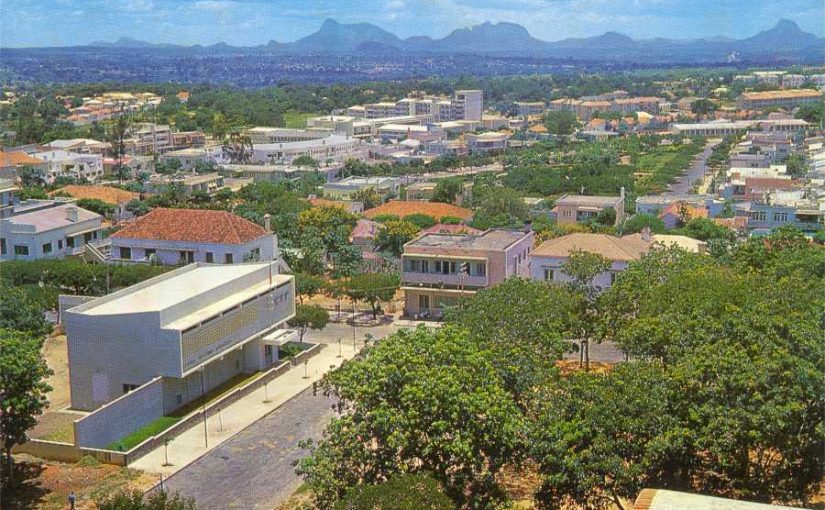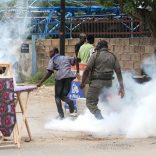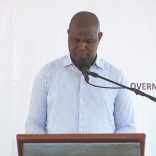Mozambique: Chissano sees post-election crisis as 'growing pain' - interview
Mozambique Elections: Nampula campaign, wrong registration date, opposition non-involvement – By Joseph Hanlon

The electoral campaign for mayor of Nampula resumed in a calm and order fashion, as had the first round. So far it has been low key, with no caravans and showmicios, and instead candidates and supporters doing door-to-door campaigning. Frelimo candidate Amisse Cololo promises better rubbish collection in suburban neighbourhoods and Renamo candidate Paulo Vanhale promises electricity in the suburbs.
No one received a majority in the 24 January vote, so the two candidates with most votes are competing in the 14 March second round. Frelimo’s Amisse won 44.51% in January and Renamo’s Paulo Vahanie gained 40.32%
The campaign began on Saturday 3 March and continues through Monday 12 March.
The third place party MDM is badly divided. The party has formally backed the Renamo candidate but some members are publicly backing Frelimo.
Renamo accuses police: A Renamo member, Feliciano António, was beaten by police when he was arrested for vandalising Frelimo posters, Renamo Nampula spokesperson Ossufo Ulane claimed. He was arrested in the early hours of the first day of the campaign, and released by noon. Police confirmed the arrest.
Ministers set wrong registration dates
Registration for October municipal and 2019 national elections was postponed by the Council of Ministers until after the Nampula second round, but Ministers announced the wrong dates. After the Council meeting on 20 February the official communiqué said registration would be between 17 March and 19 May. But that could not be correct because that is 63 days, and by law registration is 60 days. But it was official, so most media announced those dates.
When the decree was finally published, the Ministers’ mistake was corrected, and registration will be 19 March through 17 May.
CNE demands explanation
Despite subsequently trying to blame the sloppiness in Nampula on unexpected rain in the rainy season, the CNE had actually been sufficiently shocked to demand a special report. Shortly after the vote, and under pressure from opposition members, the CNE demanded a detailed report from STAE on how the process was conducted, explaining how the mistakes occurred and who was responsible.
Comment: Opposition not using its people inside
The fiasco of corrupted flash drives of register books being distributed to parties in Nampula in December shows that the opposition parties are not using the people they have inside the electoral machine.
A Bulletin investigation reveals two obvious factors: distrust between the parties and marginalisation of opposition political appointees by STAE career technicians. But a third issue emerges: opposition nominees accept defeat before they start, and see no point in trying to work within the electoral structures.
Elections are directed by the National Elections Commission (CNE) which has members appointed by parties and civil society (often party linked), but the actual election management is done by the Technical Secretariat, STAE, which is composed of civil servants. That structure is replicated at provincial and district level. In exchange for standing in the 2014 national elections, Renamo head Afonso Dhlakama was allowed a free hand to change the electoral law. His main demand was that Renamo have deputy directors and assistant managers at all levels of STAE, and that is the system now in operation.
In December STAE Nampula was required to give copies of the electoral register to the candidates for mayor in the 24 January by-election. The registers were copied onto flash drives (memory sticks), but soon after they were handed out, it transpired the STAE staff had done the copies incorrectly and there were gaps, errors and duplications. Renamo and MDM immediately went public and the CNE sent a team to Nampula to sort out the mess.
As well as the obvious question of how such a mess was possible – did no one check the flash drives before they were handed out? – two political questions arise. The first is why the opposition parties inside Nampula STAE did not see the problem, and the second is why the parties went public and used the press instead of trying to use their people inside STAE to sort out the problem
.
On the first question, Renamo claims that their people inside STAE are marginalised by the civil servants, and that they did not even know that copies of the register were being distributed to the parties. There is a CNE subcommission on electoral operations, with 2 Frelimo, 2 Renamo and 1 MDM, but it does not play an active role and did not know that copies of the register were being given to the parties.
On the second question, opposition parties said they did not try to act informally because no one would have listened.
The level of distrust remains huge. Opposition parties argue that STAE is not subordinate to the CNE, as it is supposed to be, and is politicised and acts independently of CNE. They argue that the technicians and “civil servants” in STAE have Frelimo links. They point to the person who is effectively number two in national STAE, Mário Ernesto, the long-serving director of organisation and election operations, who they say is a reserve policeman and is seconded by the Ministry of Interior – not someone the opposition could see as neutral.
In part, opposition figures take a very bureaucratic line, saying they have no formal right of intervention despite having titles of deputy director or assistant manager. But it is also clear that in this era of mobile telephones, informal intervention is possible, and the Renamo member of Nampula STAE could have simply phoned the heads of Nampula STAE and the Nampula provincial election commission to report a serious problem. Renamo has appointed some people to senior posts who should be competent enough to intervene. For example the Renamo appointed deputy director of national STAE is Estevão Fernando, a computer technician who has worked in international mining companies.
But Renamo is so convinced of the bad faith of Frelimo and STAE that it sees no point in making informal approaches. It is convinced that the confusion over the flash drives was intentional and not accidental, and therefore the only choice was to go public quickly.
Talking to opposition party people for this investigation made clear that they do not see the party appointees in STAE as having operational roles. They see them as spies for their party watching a Frelimo controlled election-machine, and they see them as party people in sinecures earning good salaries. It was more important to expose and denounce incompetence in Nampula STAE than to try to make Nampula STAE work better.
The electoral registry has been a key issue in electoral disputes, and it might be thought that if Renamo and MDM members of STAE were going to spy on anything, it would be dealing with the register books. Similarly, it would have been in their own interests to make the system work well enough to have clean copies issued.
Unfortunately, the opposition appointees in Nampula and Maputo STAE gave up before they started. It is not just STAE that needs to get its act together, but the opposition parties as well. Of course it is unequal and Frelimo has its people in STAE – but the opposition appears to be conceding defeat without even trying to improve the electoral machine.
By Joseph Hanlon












Leave a Reply
Be the First to Comment!
You must be logged in to post a comment.
You must be logged in to post a comment.